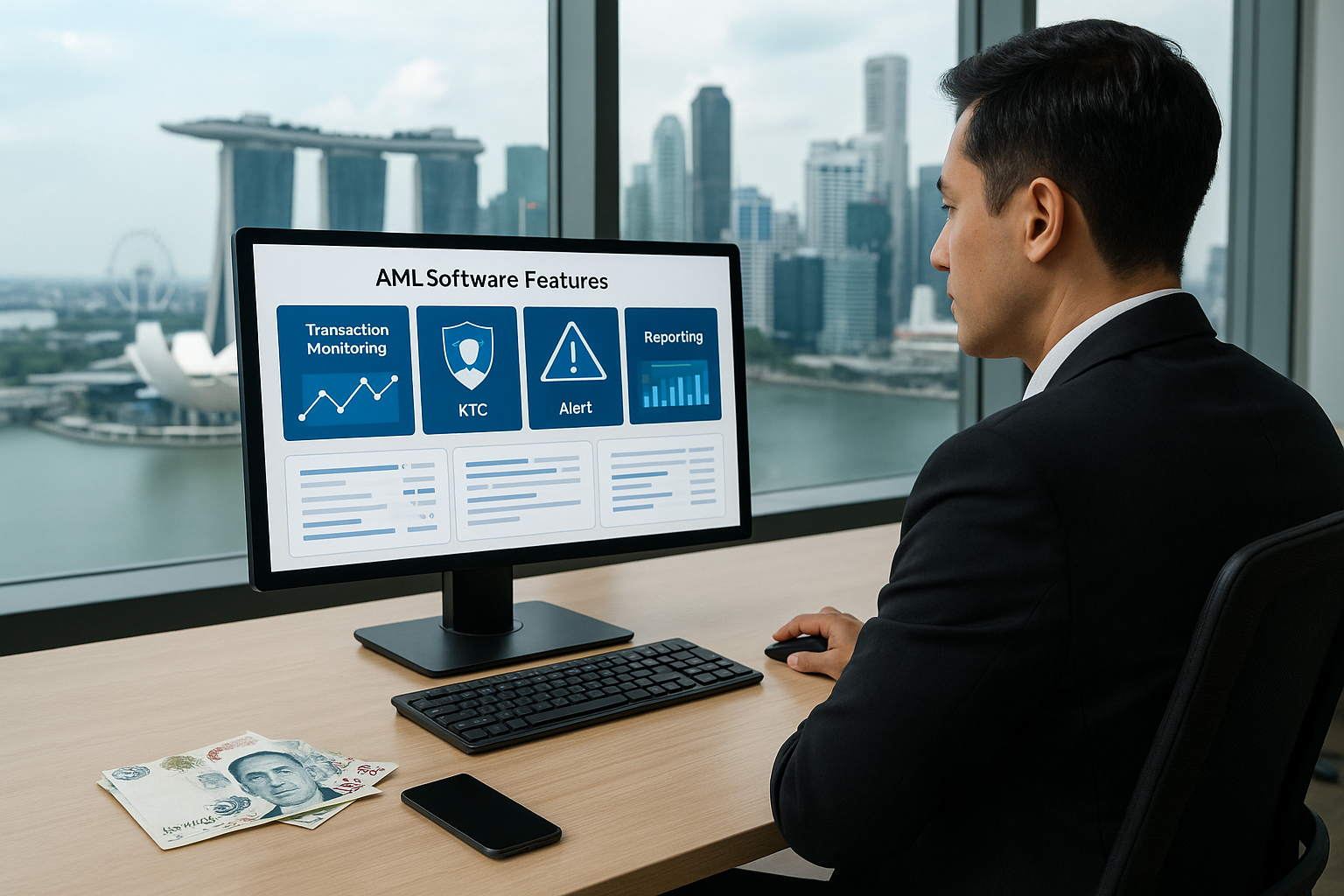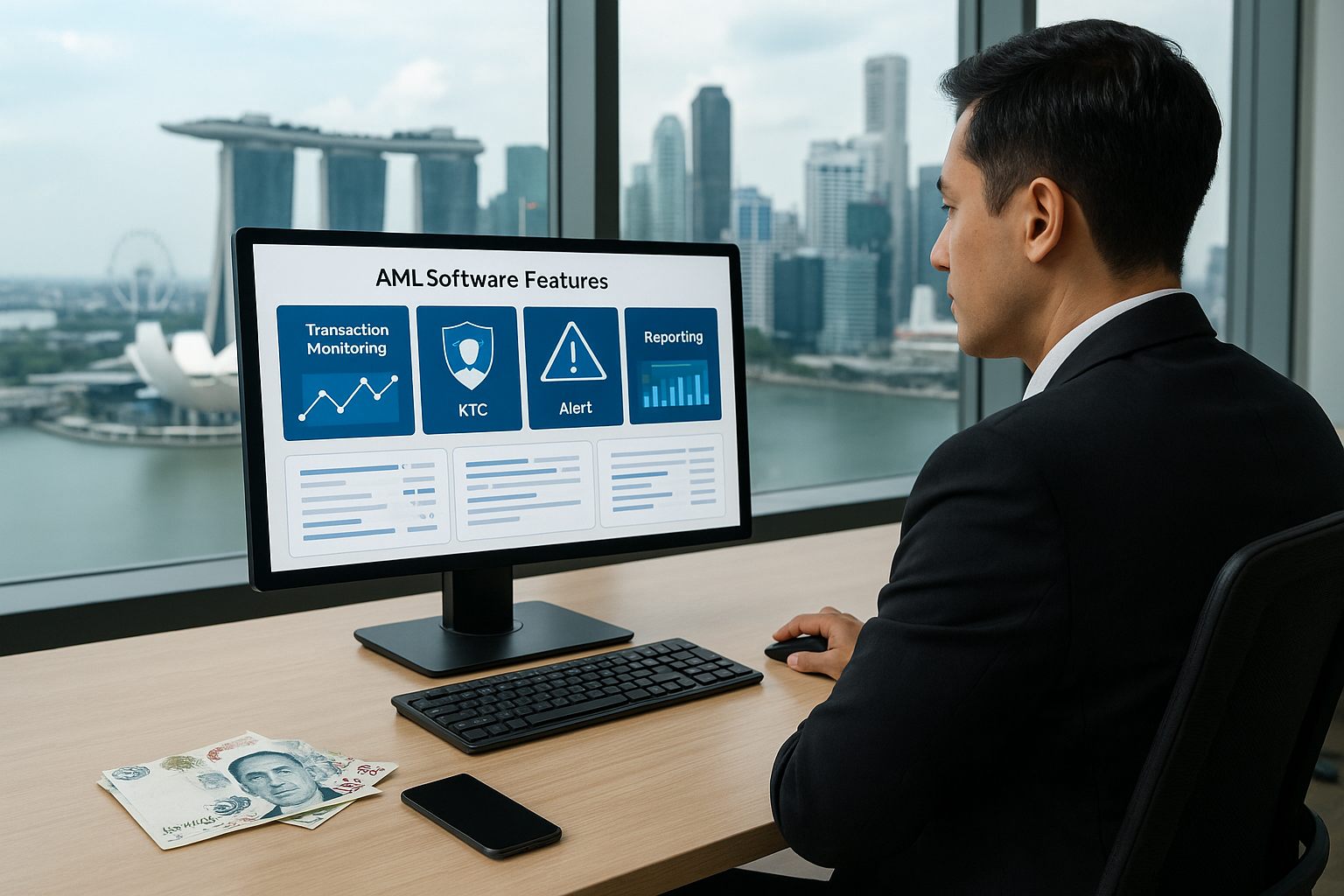Top AML Vendors for Financial Institutions
.svg)
Choosing the right AML vendor can make or break your compliance strategy.
In today’s high-risk financial environment, institutions face growing pressure to keep pace with evolving threats and tightening regulations. AML vendors have become indispensable partners in this fight, offering advanced solutions that detect suspicious activity, reduce false positives, and streamline compliance workflows.
From AI-driven transaction monitoring to dynamic risk scoring and case management tools, today’s top AML vendors are helping financial institutions improve both efficiency and effectiveness in their anti-money laundering efforts.
In this guide, we break down the leading AML vendors, their core capabilities, and how they support smarter, more proactive financial crime prevention. Whether you’re a compliance officer, fraud analyst, or decision-maker, this article will help you evaluate the best-fit solutions for your organisation.
The Critical Role of AML Vendors in Today's Financial Landscape
AML vendors play a pivotal role in the financial sector. They provide the tools and services that financial institutions need to detect and prevent money laundering.
These vendors offer a range of solutions, from risk management to regulatory compliance. They use a risk-based approach, tailoring their services to the specific needs of each institution.
In an era where financial crime is becoming increasingly sophisticated, AML vendors are more important than ever. They help institutions keep up with the evolving tactics of criminals, ensuring they stay one step ahead.
Moreover, AML vendors play a crucial role in helping institutions adapt to new regulations. With their support, institutions can ensure they remain compliant, avoiding hefty fines and reputational damage.

Key Features to Look for in AML Software Solutions
When selecting an AML vendor, it's crucial to consider the features of their software solutions. These features can greatly impact the effectiveness of your financial crime detection and prevention efforts.
The best AML software solutions offer a comprehensive view of customer activities. They provide real-time transaction monitoring and case management tools. They also have robust reporting capabilities to meet regulatory requirements.
Here are some key features to look for in AML software solutions:
- AI and Machine Learning Capabilities
- Real-Time Transaction Monitoring
- Case Management Tools
- Regulatory Compliance and Reporting
- Reducing False Positives
AI and Machine Learning Capabilities
AI and machine learning are transforming the way financial institutions detect and prevent money laundering. These technologies enhance the capabilities of AML software solutions, making them more effective and efficient.
AI-powered systems can analyze vast amounts of data quickly. They can identify patterns and trends that may indicate suspicious activity. This allows financial institutions to detect potential money laundering schemes early, preventing financial crime.
Real-Time Transaction Monitoring
Real-time transaction monitoring is a crucial feature of AML software solutions. It allows financial institutions to track customer transactions as they occur.
This feature enables institutions to identify suspicious activity immediately. It provides them with the opportunity to take swift action, preventing potential money laundering.
Case Management Tools
Case management tools are essential for efficient financial crime investigations. They help investigators manage and track cases from start to finish.
These tools provide a centralized platform for all case-related information. This makes it easier for investigators to access and analyze data, enhancing their investigative capabilities.
Regulatory Compliance and Reporting
AML software solutions must have robust regulatory compliance and reporting features. These features ensure that financial institutions meet all regulatory requirements.
These solutions should offer flexible reporting capabilities. They should be able to generate reports that meet the specific requirements of different regulatory bodies.
Reducing False Positives
False positives can be a significant challenge in financial crime detection. They can lead to unnecessary investigations, wasting valuable resources.
AI-powered AML software solutions can help reduce false positives. They can accurately distinguish between legitimate and suspicious transactions, improving the efficiency of financial crime detection efforts.
{{cta-first}}
Top AML Vendors for Financial Institutions: A Comparative Overview
Choosing the right AML vendor is crucial for financial institutions. The right vendor can provide the tools and support needed to effectively detect and prevent financial crime.
There are several top AML vendors that financial institutions should consider. These vendors offer a range of AML software solutions, each with its own unique features and benefits.
In this section, we will provide a comparative overview of three top AML vendors: Tookitaki, NICE Actimize, Oracle Financial Crime and Compliance Management, and SAS Anti-Money Laundering.
Tookitaki
Tookitaki’s FinCense platform offers a comprehensive AML compliance solution. It encompasses all aspects of AML, including customer onboarding, risk scoring, transaction monitoring, and reporting. Designed to be both adaptable and scalable, FinCense is suitable for businesses ranging from small fintech startups to large financial institutions.
A major advantage of FinCense is its seamless integration with existing systems, ensuring a smooth and efficient compliance process. The platform continuously benefits from updates through the AFC Ecosystem, keeping it effective against emerging threats.
FinCense has a modular design. This lets businesses choose the parts that fit their needs. It offers a customizable solution that grows with the business. If you need advanced transaction monitoring, smart screening, or detailed customer risk scoring, FinCense has everything you need. All these features are available in one package.
NICE Actimize
NICE Actimize is a leading provider of financial crime, risk, and compliance solutions. Their AML software solutions are designed to help financial institutions detect and prevent money laundering.
NICE Actimize offers a comprehensive suite of AML solutions. These include real-time transaction monitoring, case management tools, and robust reporting capabilities. Their solutions also feature AI and machine learning capabilities, enhancing their effectiveness and efficiency.
Oracle Financial Crime and Compliance Management
Oracle Financial Crime and Compliance Management offers a range of AML solutions. Their software is designed to help financial institutions manage their AML risk and comply with regulatory requirements.
Oracle's AML solutions feature real-time transaction monitoring and case management tools. They also offer robust reporting capabilities and AI-powered systems to reduce false positives. Oracle's solutions are scalable, making them suitable for financial institutions of all sizes.
SAS Anti-Money Laundering
SAS Anti-Money Laundering provides a comprehensive suite of AML solutions. Their software is designed to help financial institutions detect and prevent money laundering.
SAS offers real-time transaction monitoring, case management tools, and robust reporting capabilities. Their AML solutions also feature AI and machine learning capabilities, enhancing their effectiveness and efficiency. SAS's solutions are user-friendly, making them easy for investigators to use.
The Impact of Emerging Technologies on AML Efforts
Emerging technologies are having a significant impact on AML efforts. They are providing new tools and methods for detecting and preventing financial crime.
Blockchain and cryptocurrency monitoring, for example, are becoming increasingly important in the fight against money laundering. Similarly, digital identity verification is playing a crucial role in ensuring regulatory compliance and reducing the risk of financial crime.
Blockchain and Cryptocurrency Monitoring
Blockchain and cryptocurrency have introduced new challenges in the fight against money laundering. However, they also offer new opportunities for detection and prevention.
AML vendors are now offering solutions that can monitor blockchain transactions. These solutions can help financial institutions detect suspicious activity and prevent money laundering in the cryptocurrency space.
Digital Identity Verification
Digital identity verification is another emerging technology that is impacting AML efforts. It provides a powerful tool for verifying the identity of customers and reducing the risk of financial crime.
AML vendors are integrating digital identity verification into their solutions. This technology can help financial institutions ensure regulatory compliance and detect suspicious activity more effectively.
Choosing the Right AML Vendor: Factors to Consider
Choosing the right AML vendor is a critical decision for financial institutions. The right vendor can significantly enhance a financial institution's ability to detect and prevent financial crime.
There are several factors that financial institutions should consider when choosing an AML vendor. These include the vendor's reputation and track record, the features and capabilities of their AML solution, and the level of support and training they provide.
Here are some key factors to consider:
- Reputation and Track Record: The vendor's reputation and track record in the industry are important indicators of their reliability and effectiveness. Look for vendors with a proven history of helping financial institutions maintain regulatory compliance and prevent financial crime.
- Features and Capabilities: The features and capabilities of the AML solution are crucial. Look for solutions that offer AI and machine learning capabilities, real-time transaction monitoring, case management tools, and robust reporting features.
- Support and Training: The level of support and training provided by the vendor is also important. Look for vendors that offer comprehensive training on their AML solution and ongoing support to help you stay ahead of emerging financial crime trends and regulatory changes.
By carefully considering these factors, financial institutions can choose an AML vendor that best meets their needs and enhances their ability to detect and prevent financial crime.
{{cta-ebook}}
Future Trends in AML: Preparing for What's Next
The landscape of financial crime is constantly evolving, and so too are the strategies and technologies used to combat it. As we look to the future, several trends are likely to shape the AML landscape.
One key trend is the increasing use of AI and machine learning in AML efforts. These technologies can analyze vast amounts of data to detect suspicious activity, reducing the burden on human investigators and increasing the speed and accuracy of AML efforts. Financial institutions should expect to see more advanced AI-powered AML solutions in the future.
Another trend is the increasing importance of cross-border compliance. As financial institutions operate in an increasingly globalized world, they must navigate a complex web of international regulations. AML vendors will play a crucial role in helping financial institutions manage this complexity and maintain compliance across borders.
Conclusion: Choosing AML Vendors That Drive Real Impact
As financial crime grows more complex, the role of AML vendors has never been more critical. These vendors provide the technology backbone for detecting, investigating, and preventing money laundering—while helping institutions stay ahead of evolving regulations.
Selecting the right AML vendor isn’t just about ticking a compliance box. It’s about finding a partner that can scale with your business, reduce false positives, and deliver intelligent insights in real-time. Solutions like Tookitaki’s FinCense go beyond traditional rule-based systems—leveraging AI, federated intelligence, and collaborative learning to offer a truly proactive approach to AML compliance.
By evaluating the capabilities, innovation, and adaptability of today’s leading AML vendors, financial institutions can strengthen their risk posture, reduce operational costs, and build long-term trust with regulators and customers alike.
The right AML vendor doesn’t just help you comply, it helps you compete.
Experience the most intelligent AML and fraud prevention platform
Experience the most intelligent AML and fraud prevention platform
Experience the most intelligent AML and fraud prevention platform
Top AML Scenarios in ASEAN

The Role of AML Software in Compliance

The Role of AML Software in Compliance










